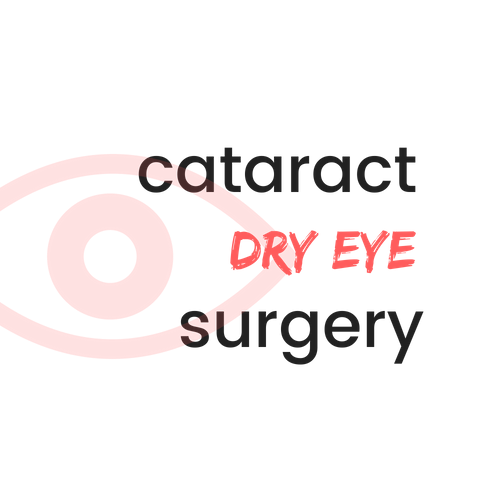Cataract Surgery and Dry Eye
July 9, 2018

July is Dry Eye Awareness Month and in recognition of that, this article discusses the relationship between cataracts and dry eye syndrome.
Cataracts and dry eyes are both common conditions in people 50 and older. If dry eye syndrome is not treated before cataract surgery, it can complicate pre-operative measurements and lead to frustrating results after cataract surgery. Too many patients become dissatisfied to learn about dry eye symptoms after going through cataract surgery.
Evaluate Every Cataract Patient for Dry Eyes
During every cataract evaluation, we are also looking for signs and symptoms of dry eye. Dr. Shilpa Rose is nationally recognized for lecturing about the importance of recognizing and treating dry eye before any vision correction surgery, especially cataract surgery.
The tear film break-up test, corneal staining, tear film assessment, the Schirmer test, a slit lamp biomicroscopic examination are some of the basic diagnostic tests used to determine dry eye.
Treating dry eye before cataract surgery will stabilize the ocular surface and increase the accuracy of the preoperative IOL measurements.
If the dry eye is severe, punctal plugs can be used a few weeks before surgery to improve the ocular surface.
While there may not be an actual cure for dry eye, preparing your ocular surface prior to anticipated cataract surgery will certainly minimize post-operative complaints and results.
Effective Dry Eye Treatments
Proper diagnosis of the underlying cause of dry eye will guide our treatment recommendations.
Meibomian gland dysfunction (MGD) is a common cause of dry eye. The meibomian glands usually secrete an oily substance which coats the tear film and prevents evaporation. If dry eye is due to MGD, the treatment may include warm compresses, manual expression, or thermal pulsation with LipiFlow.
We are one of the few regional centers equipped with LipiScan and LipiFlow - technology to directly visualize diseased meibomian glands and treat them with thermal pulsation.
If the dry eye is due to insufficient tear production, artificial tears, punctal plugs or prescription anti-inflammatory medications may be helpful.
Some patients with mild dry eye symptoms can use over-the-counter artificial tears along with oral fatty acid supplements, such as fish oil, or flaxseed oil for your vegetarian and vegan patients, to relieve their dry eye symptoms.
We realize that both dry eye and cataracts commonly affect our patients. Diagnosing and treating dry eye before anticipated cataract surgery allows us to exceed your visual expectations.
[/et_pb_text][et_pb_text _builder_version="3.3" global_module="2332"]
If you would like to make an appointment with Drs. Whitten or Rose, you may CALL US or USE OUR CONTACT FORM.



